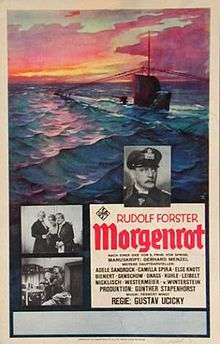Morgenrot (film)
| Morgenrot | |
|---|---|
 | |
| Directed by |
Vernon Sewell Gustav Ucicky |
| Produced by | Gunther Stapenhorst |
| Written by | Gerhard Menzel (Idea: Edgar von Spiegel von und zu Peckelsheim[1]) |
| Starring |
Rudolf Forster Fritz Genschow Paul Westermeier Camilla Spira |
| Music by | Herbert Windt |
| Distributed by | Universum Film AG (UFa) |
Release dates |
|
Running time | 75 minutes |
| Country |
Weimar Republic Nazi Germany |
| Language | German |
Morgenrot is a 1933 German submarine film set during World War I.
Released three days after Adolf Hitler became Reichskanzler, it was the first film to have its screening in Nazi Germany. It became a symbol of the new times touted by the Nazi regime.[2]
The title (literally "morning-red") is the German term for the reddish coloring of the east sky about a half-hour before the sunrise. Dawn was the U.S. title.
It was filmed in Kiel, Schleswig-Holstein, the first German submarine movie made after World War I.
Motifs
The film offered a heroization of death, with the captain explicitly stating that Germans may not know how to live, but they know how to die.[3] In a central scene, the captain of the submarine offers to his men that he and the first officer will go down with the ship in order that they may escape; they refuse on the grounds it will be all or none of them, and the captain glorifies the chance to die with such men, a theme that commonly appeared in Nazi-era films.[4]
The first officer, having learned that the woman he loves is in love with captain, not himself, and another sailor commit suicide to save the others – a common way to resolve love triangles in Nazi films, where the heroic death saves the man from failure.[5]
On the other hand, the mother of one man refuses to rejoice over her son because of the suffering of war – a theme that would not appear in Nazi film.[6]
Awards
The National Board of Review of Motion Pictures awarded it with Best Foreign Film for 1933.[7]
References
- ↑ E. Baron v. Spiegel at the Internet Movie Database; Joerg Friedrich Vollmer: Imaginaere Schlachtfelder. Kriegsliteratur in der Weimarer Republik – eine literatursoziologische Untersuchung. PhD Thesis, Freie Universitaet Berlin 2003 (Chapter 5, p 413) Online Edition
- ↑ filmportal.de
- ↑ Jay W. Baird, The Mythical World of Nazi War Propaganda, p 8 ISBN 0-8166-0741-9
- ↑ Erwin Leiser, Nazi Cinema p. 20 ISBN 0-02-570230-0
- ↑ Erwin Leiser, Nazi Cinema pp. 20–1 ISBN 0-02-570230-0
- ↑ Erwin Leiser, Nazi Cinema p. 21 ISBN 0-02-570230-0
- ↑ "New York Times: Morgenrot (1933)". NY Times. Retrieved 2010-10-31.
External links
- Morgenrot at the Internet Movie Database
- Morgenrot at AllMovie